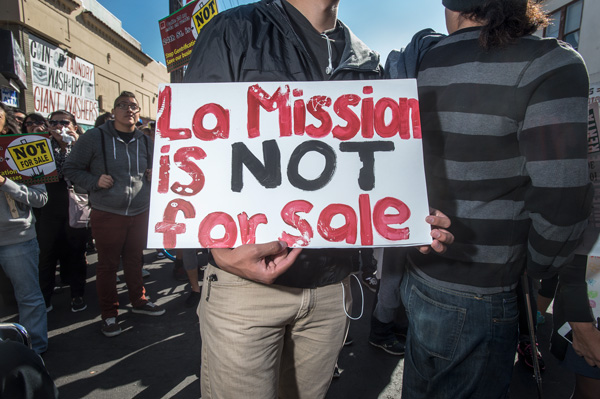Op-ed: City Council Must Take Immediate Steps to Address to Housing Crisis
Oct 16, 2015
Representatives must take emergency action to halt displacement of Oakland residents

By Margaretta Lin
In the tradition of Dr. King, Pastor Agee of Pastors of Oakland and Reverend Buford of Allen Temple remind us that housing is a human right guaranteed under international covenants. It is the job of government to ensure that these rights are safeguarded for its people.
Today, Oakland families making the median tenant household income of $34,195 would have to pay over 90 percent of their income to cover the current median rent of $2,650.
What can the City of Oakland do to address this unprecedented housing crisis?
There are emergency measures such as enforcing the City’s Tenant Protection Ordinance, using public lands for temporary housing, and requiring a City process prior to tenant evictions.

In addition, on Sept. 30 the City Council approved the Oakland Housing Equity Roadmap. Specific ordinances must now be developed and sent to the council for adoption.
The crisis is real and immediate. Foreclosures have devastated Oakland, with the loss of over 11,000 homes. The African American homeownership rate in East Oakland areas has declined by 25 percent.
Over 90 percent of foreclosed homes in East and West Oakland were purchased by investors and largely flipped into market rentals. Under state law, rent controls are not allowed on these single-family homes.
What was once affordable homeownership for Oakland’s working-class became—overnight–unaffordable.
Further, the regional economic boom has escalated demands for housing but is generating jobs mainly at polar ends—high-wage tech and other professional jobs or low-wage service jobs. Housing supply has continued to grossly lag behind the demand.
Finally, structural racism continues to impact access to stable jobs for people of color. This has resulted in a racial wealth gap. From 2000 to 2010, incomes for Oakland’s African American, Latino, and Asian populations declined, while income for the White population increased.
We need comprehensive action from the City Council, Mayor, City Administration, and stakeholder groups. The roadmap identifies 17 recommended actions for these groups.
These strategies are pragmatic—vetted by City departments and based upon best practices.
Nine of these strategies require changes to existing laws and City Council action. The below is a modified City staff timeline for Council legislative action.
Fall 2015:
Tenant eviction protection & relocation requirements; Condo conversion protections; and Seismic retrofit with anti-displacement protections
Winter 2016:
Public lands for affordable housing; Allow second units; and Housing Impact Fee & Mixed Income Development;
Spring 2016:
Proactive rental inspection with anti-displacement; housing bond; and dealing with vacant lots.
Anti-displacement strategies include: preventing the conversion of 29,000 at risk rental units into market rate condo; improving tenant eviction protections and relocation requirements; and requiring the seismic retrofit of 14,000 at-risk rental units with anti-displacement protections.
In addition, city officials can prevent continuing foreclosures through a distressed mortgage notes program.
Strategies to produce more affordable housing include: using public lands for affordable housing; charging a housing impact fee; requiring mixed-income housing on private projects; facilitating second units; and waiving city liens to transform problem properties.
The City can also lead a housing bond measure.
To improve habitability requires a City Council proactive rental inspection policy.
While the city does not have the ability to change regional economic trends, it does have the ability and obligation to house its residents.
As former Congressman and Mayor Ron Dellums says, “Democracy rests on people asserting the fullness of their human rights.”
We greatly need Oakland’s people to engage and demand action from their representatives.
Margaretta Lin is the co-author of the Oakland Housing Equity Roadmap along with Kalima Rose from PolicyLink. She was director of Strategic Initiatives for the City of Oakland’s Department of Housing and Community Development and is currently a principal at the Dellums Institute, a social justice advocacy organization.